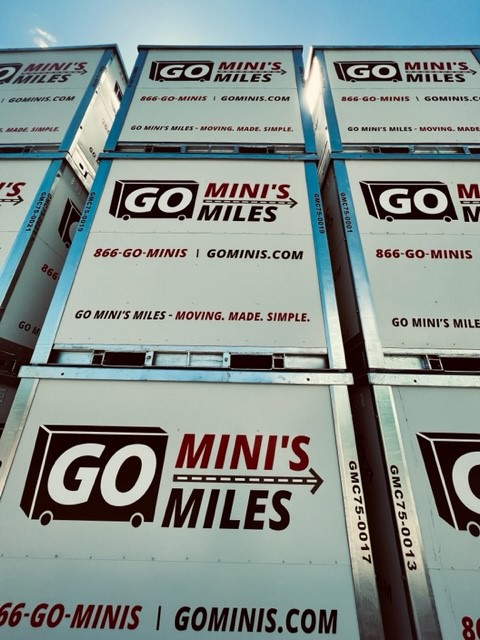As the chief executive of Go Mini’s Franchising LLC, Chris Walls admits that even though the company is the third largest portable storage firm in the market, “no one necessarily knows us.”
The Westlake Village-based storage and moving company is trying to change that.
For one, it is doing a lot online and on social media. In addition, it is debuting its second national television commercial this month.
“We are really starting to invest in the brand so that people know about us,” Walls said. “It is starting to get some traction.”
Go Mini delivers storage containers to a client’s home or business. Clients then load them with their possessions and the containers are placed in storage or moved to a new location.
The company’s corporate revenues were about $6 million last year, achieved through franchise fees and container sales. Walls said that he anticipates revenue of more than $7 million this year.
A franchise-only business, Go Mini’s has locations in 41 states. It converted from corporate-owned dealerships to franchises in 2012, about 10 years after the company was founded by Bill and Sheila Norris in Jacksonville, Florida.
The couple sold most of their stake in the business to a group of private investors after the switch to franchising. The couple maintains a 20% share in Go Mini’s.
Jason McLaughlin has been a Go Mini’s franchisee for five years in Fullerton in Orange County. He has 315 containers spread out between Fullerton and two satellite yards to handle the market.
He said he was overall pleased with how the corporate office handles marketing adding that they run a lot of different marketing campaigns, from as simple as a coupon, to radio and podcasts and to more tech-heavy advertising, he said.
“They are on the cusp of rolling out an infomercial type program that will be broadcast in certain markets,” McLaughlin said.
“For the most part, they manage the marketing that is more broad-brushed and more of from a perspective of the overall brand for the Go Mini’s platform,” he added. “The individual franchises themselves are more focused on our local Google-type advertisements and then whatever ancillary marketing platforms we decide to use.”
Storage sector
According to IbisWorld, a market research firm with its U.S. headquarters in New York, the mobile storage industry in the U.S. is expected to generate $11.3 billion through the end of the year. That figure includes a 4.4% revenue decline, and profits are expected to decrease by 14.2%.
Causing instability in the mobile storage services industry are increased interest rates, according to IbisWorld.
“Propelled by the growth of the housing market and growth in corporate spending, the industry performed well prior to the expansion in interest rates in 2022,” IbisWorld said. “Although the industry mainly serves the residential market, mobile storage companies also serve the retail and corporate markets. Demand from retail customers has largely returned as Americans have increased spending on consumer goods, cooling down some volatility.”
Despite all of this, Go Mini’s has been growing. It added about 10 new franchises last year and another 14 the year before that, Walls said.
The company continues to improve services for its franchisees, he added.
Two years ago, it developed a platform called Go Mini’s One, an operating system that allows a franchise owner to run his or her business from their phone or tablet, Walls said.

“One of our franchisees, maybe it’s 8 o’clock at night and they are watching their son, daughter or grandchild play baseball and he gets a lead, he can book that lead while there (at the game) in a matter of minutes,” Walls said.
Go Mini’s One streamlines and makes the business more efficient, he continued. The customers love it because their credit card information gets directly put into the system, which also sends out texts or emails to alert a client that its shipping container is on the way. Afterward, it contacts the client to follow up on how the service was, he said.
“It’s a real nice system that we’ve done and one of the added benefits for (owners),” Walls said. “It’s proprietary and it’s only available to Go Mini’s franchisees.”

Competitors
Of its competitors, which include 1-800-Pack-Rat and Zippy Shell, both based in Wake Forest, North Carolina, and Mi-Box Moving & Storage, located in Joliet, Illinois, the biggest one of them all – “the 800-pound gorilla,” according to Walls and McLaughlin – is Pods Enterprises LLC, which is based in Clearwater, Florida.
Founded in 1998, the company has both franchised and corporate-owned locations in the U.S., Canada, England and Australia. It operates much like Go Mini’s – by delivering a storage container to the customer’s location to be packed and then stored or delivered to another location. Pods is owned by the Ontario Teachers’ Pension Plan.
Competing against a Pods or Pack-Rat or Mi-Box comes down to being able to offer local service, Walls said.
“You can call our guy and he’ll say, ‘I can get (a container) there for you today’ or ‘I’ll get it for you there tomorrow,’ because of how we structured the business and where they’re located,” Walls said.
A lot of Go Mini’s’ customers have come from the competition, he added, because those other companies have gotten too big.
“They have all been purchased by private equity,” Walls said. “And we kind of know what happens with that and how private equity tries to drive costs down and that affects service levels. So we see that as an opportunity.”
The franchisees set their own prices, but generally the cost to rent a storage container and maintain it on the client’s property can range from $139 for the smallest units to $359 for the largest units, Walls said, adding there is a standard delivery and pick-up fee, which ranges from $49 to $150. For longer distances, additional mileage may be charged.
Go Mini’s also competes by being nimble.
The corporate office sets up its franchisees with their own social media accounts and it helps them with marketing. But the corporate office also wants the franchisees’ input and encourages them to localize, because sometimes a corporate ad doesn’t work, Walls said.
“We like to say we have a national business, but that you can operate like a local business and be a part of your community, whereas Pods and Pack-Rat have gone kind of corporate,” he added.
Pods and Pack-Rat did not reply to interview requests.
Zippy Shell and Pack-Rat merged in 2018 but continue to operate as separate brands serving their customer bases. The companies are owned by Virgo Investment Group, a private equity firm based in San Francisco.
Said McLaughlin, the Fullerton franchise owner, “We have the big people, and we are striving to chase after crumbs from their table in regard to the brand recognition they have. But there is a good group of middle-tier players in our industry as well,” he said, adding that that group included Go Mini’s.
